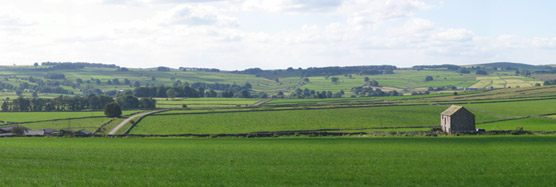








Andrew principally teaches two undergraduate courses, a second year "Biodiversity Field Course", and "Evolutionary Ecology" in third year.
Biodiversity Field Course

This seven day residential field course is based in the Peak District in September. The module aims to introduce students to practical techniques in field biology against a background of awareness of the variation in British habitat types. Students visit three contrasting habitats and are encouraged to use self-collected data on a taxonomic group of their choice to explore basic concepts in ecology and conservation such as species-area relationships, the measurement of richness and diversity and the design of reserve networks. Students gain an understanding of ecological survey techniques, basic taxonomy, data analysis, vocal presentation and scientific writing. The module is assessed through a combination of field notebook, group presentation and a 3,000 word report.
Evolutionary Ecology
 The module describes the workings of natural selection in wild populations, the ecology that drives it, the processes that constrain it and the microevolution that results. It encourages students to use the primary literature to explore different intellectual tools for addressing questions about nature such as models, observations, experiments and the comparative method, and to think about their strengths and weaknesses. Students are also encouraged to think critically about the (natural) world, to present ideas clearly and concisely and to realise that 'science' is better seen as a process than as a body of fact. Topics include: Natural selection, The maintenance of variation, Evolution of life histories, Competition and evolution, Coevolution of predators and prey, Coevolution of hosts and parasites, Coevolution of mutualists, and Ecology and the origin of species. The module is assessed by a combination of in-class data interpretation exercises and an exam.
The module describes the workings of natural selection in wild populations, the ecology that drives it, the processes that constrain it and the microevolution that results. It encourages students to use the primary literature to explore different intellectual tools for addressing questions about nature such as models, observations, experiments and the comparative method, and to think about their strengths and weaknesses. Students are also encouraged to think critically about the (natural) world, to present ideas clearly and concisely and to realise that 'science' is better seen as a process than as a body of fact. Topics include: Natural selection, The maintenance of variation, Evolution of life histories, Competition and evolution, Coevolution of predators and prey, Coevolution of hosts and parasites, Coevolution of mutualists, and Ecology and the origin of species. The module is assessed by a combination of in-class data interpretation exercises and an exam.